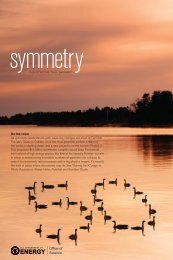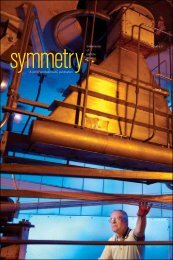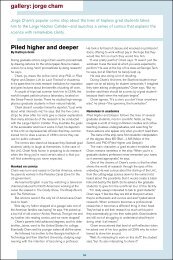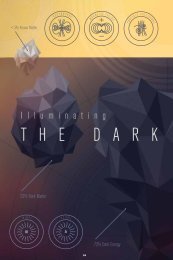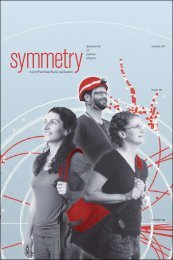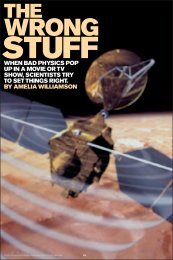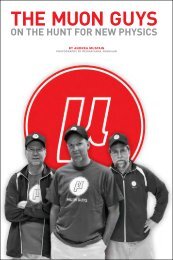Download Issue PDF - Symmetry magazine
Download Issue PDF - Symmetry magazine
Download Issue PDF - Symmetry magazine
You also want an ePaper? Increase the reach of your titles
YUMPU automatically turns print PDFs into web optimized ePapers that Google loves.
As at other labs, weekly practices must compete with work and familycommitments. “Sometimes we have more bottles of red wine than musicians,”says saxophone player Christian Mrotzek. That’s OK, he says, becausethe night is as much about socializing and relaxing as making music.Rüter, who initiated the group, took to music much later than his bandmates did. As a young man he was captivated by the free-spirited, highenergyvibe of jazz clubs and wanted to take up the trumpet. He just neverfound the time until a DESY colleague walked into his office talking aboutmusic. Rüter was 50 at the time. He shared his desire to play, the colleaguesaid he had extra trumpets at home, and for the next nine yearsRüter practiced and played off and on with friends before launching BlueWine with fellow lab employees. The band has been together five years.Mrotzek, meanwhile, had been playing saxophone. He didn’t want tobother anyone, so he practiced his instrument in a guest room below thelab’s cantina. That’s where guitar player Bernd Reime found him. AsMrotzek recalls it, Reime asked, “What are you doing here? There is a bandnearby. You have to come play.”Later, Reime saw Felix Beckmann walking through the lab with a trombonecase. The men started bumping into each other and into other musiclovers and talking about songs. Blue Wine was solidifying.Drummer Peter Gasiorek had retired, but came back at age 67 to join theband because it gave him a connection to the lab and his old colleagues.Judging from audience reactions at DESY and other labs, they seem toenjoy those connections, too.Physics ChanteuseLynda Williams, whose day job isteaching physics and astronomy, addsa cabaret feel and political bent toher music as the Physics Chanteuse.Photo courtesy of Lynda WilliamsPhysics cabaretSome bands use music to enrich their lives; others use it as a way to shownon-scientists their world.The Cernettes sing about physics concepts in songs like “Every Protonof You” or “Big Bang.” They also sang “Surfing on the Web” in 1992, at atime when the World Wide Web, created at CERN to allow physicists to sharedata, was a mystery to most people. The first photo on the Web wasof the Cernettes, who also claim to have created the first homepage fora musical act.Lynda Williams also sings about physics, but with a political message.As the Physics Chanteuse, she croons about the 1980s political downfallof the Superconducting Super Collider, which was abandoned midwaythrough construction in Texas. In “Hi Tech Girl,” set to the tune of Madonna’s“Material Girl,” her backdrop is a photo montage of 300 women scientists.Women have not always found her act endearing, though. She dressesin evening gowns or slinky cocktail dresses with go-go boots, turning heract into a cabaret. Some say the sex appeal in the show demeans the science,but Williams, who teaches physics and astronomy at Santa RosaJunior College and formerly at San Francisco State University, says it doesjust the opposite.“I can prove science is super-sexy,” she says. “I don’t mean pornographic;I mean titillating. It’s cool. It’s slick. String theory and high-energy particlephysics are as cutting edge as there is. People are really, really interestedin smart, sassy, sexy science and that is what I do.”The American Institute of Physics commissioned her to write a songfor Valentine’s Day. The result was “Love Boson,” about an unmeasurableparticle that mediates the force of love. Physicists cheer the show, shesays, but it’s the engineers, political junkies, and science fans who really gowild. And winning over those groups helps scientists make the case forcutting-edge research projects to the general public.She says she hopes her songs encourage people to spread the messagethat understanding science is power.“If I am going to talk about global warming or carbon dating, before I canmake a political comment people have to understand the science,” Williamssays. “They are always surprised. They say, ‘I had no idea this is what scienceis about.’”23symmetry | volume 05 | issue 01 | jan/feb 08



